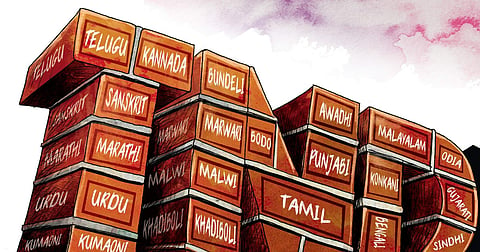

NEW DELHI: No language will be imposed on any state, the Centre said on March 19 in the Rajya Sabha.
In a written reply, Dr Sukanta Majumdar said that the National Education Policy (NEP), 2020, inter-alia, at para 4.13, provides that the three-language formula will continue to be implemented keeping in mind the constitutional provisions, aspirations of the people, regions, Union and the need to promote multilingualism and national unity.
“However, there will be a greater flexibility in the three-language formula, and no language will be imposed on any state,” he said.
“The three languages learned by children will be the choices of states, regions, and of course the students themselves, as long as at least two of the three languages are native to India,” the minister said to a question from CPI (M) leader, Dr John Brittas.
He had asked if the government is aware of the concerns and ongoing agitations in Tamil Nadu against the imposition of Hindi under National Education Policy 2020.
The minister further said that in particular, students who wish to change one or more of the three languages they are studying may do so in Grade 6 or 7, as long as they can demonstrate basic proficiency in three languages (including one language of India at the literature level) by the end of secondary school.
NEP 2020 allows the students to choose the language they wish to study provided at least two of the three languages are native to India, he added.
The minister quoted NEP-2020, para-4.12, “..research clearly shows that children pick up languages extremely quickly between the ages of 2 and 8 and that multilingualism has great cognitive benefits to young students, children will be exposed to different languages early on (but with a particular emphasis on the mother tongue), starting from the Foundational Stage onwards."
All languages will be taught in an enjoyable and interactive style, with plenty of conversation, with early reading and subsequent writing in the mother tongue in the early years, and with skills developed for reading and writing in other languages in Grade 3 and beyond.
"Extensive use of technology will be made for teaching and learning of different languages and to popularize it," he said.
Majumdar said the NEP-2020 policy also provides for making high-quality textbooks available in the mother tongue and encouraging teachers to use a bilingual approach while teaching.
To achieve this objective, the government is integrating multilingualism at school and higher education levels by providing reading materials in Indian languages so that students can have a choice to study in their mother tongue/local language.